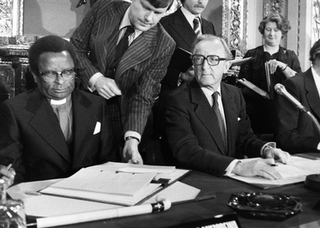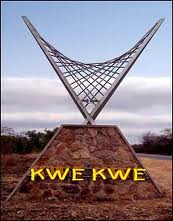
Joshua Mqabuko Nyongolo Nkomo was a Zimbabwean politician who served as Second Vice-President of Zimbabwe under Robert Mugabe from 1987 to 1999. He was leader and founder of the Zimbabwe African People's Union (ZAPU) party, and a member of the Ndebele people.

The Lancaster House Agreement, signed on 21 December 1979, declared a ceasefire, ending the Rhodesian Bush War; and directly led to the creation and recognition of the Republic of Zimbabwe. It required the imposition of direct British rule, nullifying Rhodesia’s 1965 Unilateral Declaration of Independence. British governance would be strictly proscribed to the duration of a proposed election period; after which independence would follow. Crucially, the political wings of the black nationalist groups ZANU and ZAPU, who had been waging the escalating, and increasingly violent insurgency, would be permitted to stand candidates in the forthcoming elections. This was however conditional to compliance with the ceasefire and the verified absence of voter intimidation.
Herbert Wiltshire Pfumaindini Chitepo led the Zimbabwe African National Union until he was assassinated on March 1975. Although his murderer remains unidentified, the Rhodesian author Peter Stiff says that a former British SAS soldier, Hugh Hind was responsible.

Edgar Zivanai Tekere, nicknamed "2 Boy", was a Zimbabwean politician. He was the second and last Secretary General of the Zimbabwe African National Union (ZANU) who organised the party during the Lancaster House talks and served in government before his popularity as a potential rival to Robert Mugabe caused their estrangement.
Zimbabwe African National Liberation Army (ZANLA) was the military wing of the Zimbabwe African National Union (ZANU), a militant African nationalist organisation that participated in the Rhodesian Bush War against white minority rule of Rhodesia.

Parliamentary elections were held in Zimbabwe on 24 and 25 June 2000 to elect members of the House of Assembly. The electoral system involved 120 constituencies returning one member each, elected by the First Past the Post system, with the President of Zimbabwe then nominating 20 members and ten further members from the Tribal Chiefs sitting ex officio. This was the first national election in which Zimbabwe's ruling Zanu-PF party had faced any real opposition since the 1980s. The newly formed Movement for Democratic Change challenged Mugabe's control of parliament. The MDC won 57 of the 120 elected seats, with 47% of the popular vote. Zanu-PF won 63 seats and carried approximately 48% of the popular vote.
Josiah Mushore Chinamano fought in the Rhodesian Bush War as a guerrilla of the Zimbabwe African People's Union. He later served as the Minister of Transport.
James Robert Dambaza Chikerema served as the President of the Front for the Liberation of Zimbabwe. He changed his views on militant struggle in the late 1970s and supported the 'internal settlement', serving in the attempted power-sharing governments.
Enos Mzombi Nkala was one of the founders of the Zimbabwe African National Union.

Sarah Francesca "Sally" Mugabe was the first wife of Robert Mugabe and the First Lady of Zimbabwe from 1987 until her death in 1992. She was popularly known as Amai (Mother) in Zimbabwe.

Gutu is the third largest district in Masvingo Province, southern Zimbabwe, after Chiredzi and Mwenezi. It is the northernmost district in the province. The name "Gutu" is historically reported to have emerged from "Chinomukutu wemiseve" – meaning, "the one with a load of arrows". This is according to oral historical folklore of the "Gumbo" clan who are said to have taken over the area from the "Shiri" clan through killing them by poisoning the fruit trees in the "Gona" area. Mupandawana is the largest district service centre. It was designated as a "growth point" during the early years of independent Zimbabwe together with such places as Gokwe in the Midlands Province and Juru in Mashonaland East province. Mpandawana gained town status in April 2014.
Ruth Lottie Nomondo Chinamano was a ZANU-PF politician and wife of Josiah Mushore Chinamano.

Paul Tangi Mhova Mkondo was a Zimbabwean nationalist, part of the first group of Gonakudzingwa restriction camp political prisoners, Pioneer Insurance Executive, Business magnate, Academic, philanthropist, conservationist, pioneer Indigenous businessman and entrepreneur.

The Battle of Sinoia was a small military engagement fought near Sinoia between a small group of Zimbabwe African National Liberation Army (ZANLA) guerrillas and Rhodesian police on 28 April 1966. The skirmish is sometimes considered as the opening engagement of the Rhodesian Bush War. A team of seven ZANLA cadres engaged with British South Africa Police forces near the northern town of Sinoia. The guerrilla group was wiped out, the police killing all seven. There were no police casualties.
Julia Tukai Zvobgo was a Zimbabwean activist and politician.
Donjane is ward 32 of the 33 wards in Zibagwe Rural District Council under Kwekwe District. It is in Zhombe-East in the Midlands.
Kwekwe-Gokwe Highway or the R84-7 Highway is an all-weather bitumen macadam highway in Zimbabwe running from Kwekwe to Gokwe passing through Zhombe. as a trunk road it is officially the P11 Highway
Cephas George Msipa was a Zimbabwean politician.

Mutange Dam, across Mutange River, is a manmade earth fill embarkment dam located in Chisina Village, 30 km east of Gokwe and 35 km northwest of Empress Mine, in the Midlands Province, of Zimbabwe. Mutange Dam is 42 km by road from Gokwe and 49 km from Empress, 117 km from Kadoma and 146 km from Kwekwe via Empress. It is owned and operated by the Ministry of Water Resources and Development.










